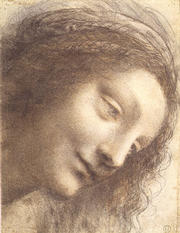 by Flemming Funch by Flemming Funch
Tomalak mentions Leonardo da Vinci, Disciple of Experience, a brief article by Mark Hurst on Good Experience, about how da Vinci was a man of direct experience, dedicated to perceiving and experiencing things directly, as opposed to just talking about them academically.The sketches, of course, were beautiful. But what really struck me was the sheer breadth of this one man's talents. da Vinci wrote treatises on physics, anatomy, astronomy, warfare, art, and other topics. Without a formal education, da Vinci never mastered Latin, the language in which academic treatises were written at that time. Some scholars dismissed his work.
da Vinci replied that he was a "disciple of experience": "[They may say] I'm a man without learning, [but] I will cite something far more worthy, quoting experience..." In another essay, da Vinci writes that ...the subjects I am dealing with are to be dealt with by experience rather than by words, and experience is the muse of all who write well. And so, as my muse, I will cite her in every case. 500 years ago, da Vinci understood the power of experience. Academic pedigree is fine, but a direct grasp of experience is essential. Analyzing and learning from direct experience is innately more powerful than hiding behind obscure academic methods. da Vinci "got it." Maybe he was the first.
500 years later, there are still those academics whose frameworks, methods, and terminology talk *about* experience but don't help much in bringing people to an understanding of the experience itself. Remember the Italian scholars who were so concerned with da Vinci's knowledge of Latin (the "method" of the day) that they completely missed (or dismissed) his genius - and didn't help others to see it. Ah, yes, there's no better teacher than direct experience with your own senses. But it isn't always what is most fashionable.
|
|
 by Flemming Funch
by Flemming Funch